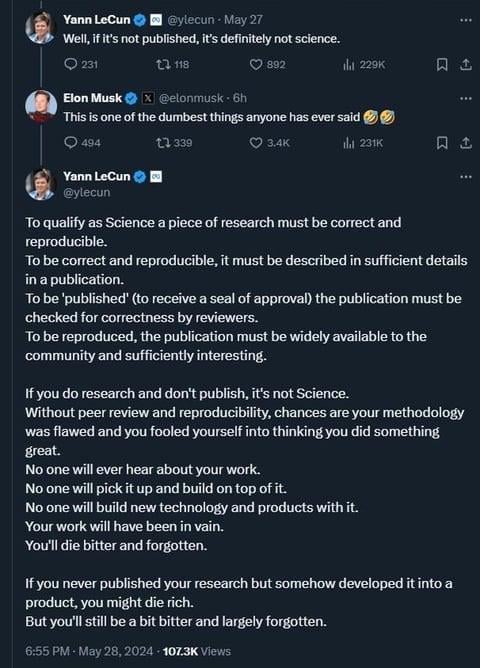this post was submitted on 29 May 2024
1339 points (95.3% liked)
Science Memes
11516 readers
2688 users here now
Welcome to c/science_memes @ Mander.xyz!
A place for majestic STEMLORD peacocking, as well as memes about the realities of working in a lab.

Rules
- Don't throw mud. Behave like an intellectual and remember the human.
- Keep it rooted (on topic).
- No spam.
- Infographics welcome, get schooled.
This is a science community. We use the Dawkins definition of meme.
Research Committee
Other Mander Communities
Science and Research
Biology and Life Sciences
- [email protected]
- [email protected]
- [email protected]
- [email protected]
- [email protected]
- [email protected]
- [email protected]
- [email protected]
- [email protected]
- [email protected]
- [email protected]
- [email protected]
- [email protected]
- [email protected]
- [email protected]
- [email protected]
- [email protected]
- [email protected]
- [email protected]
- [email protected]
- [email protected]
- [email protected]
- [email protected]
- [email protected]
- !reptiles and [email protected]
Physical Sciences
- [email protected]
- [email protected]
- [email protected]
- [email protected]
- [email protected]
- [email protected]
- [email protected]
- [email protected]
- [email protected]
Humanities and Social Sciences
Practical and Applied Sciences
- !exercise-and [email protected]
- [email protected]
- !self [email protected]
- [email protected]
- [email protected]
- [email protected]
Memes
Miscellaneous
founded 2 years ago
MODERATORS
you are viewing a single comment's thread
view the rest of the comments
view the rest of the comments

If we're talking about gatekeeping what is and isn't capital-S Science, I'd really like to know where these "hard definitions" are coming from.
Wikipedia's page for the Scientific Method seems to get it wrong when it describes it as "a general set of principles," the core of which is forming falsifiable hypotheses and testing them... and the details vary from field to field and across different time periods. Sounds like you can do that at home.
The page for Science appears to also contradict the "hard definition" when it describes science as spanning most of human history, long before the modern institutions of formal publication and peer review, and doesn't describe them as mandatory at all. Definitely doable at home, as far as I can tell.
That's not to say that scientific collaboration isn't valuable, btw... I just can't find any basis to support the idea that if it's not published in a formal academic journal, then it's definitely not science, and that science CAN'T happen without the involvement of the institutions.
So like... Where does this "hard definition" that people keep talking about come from, and why doesn't Wikipedia seem to know about it?
It comes from literature I did read over a decade ago, which titles I no longer have, which argued (in a very summarised sense), that science as we know it today is only possible due to the development of social institutions and methodology that have been refined over centuries (and arguably, are currently in an evolving process), in ways that make it fundamentally different (in its workings, its results, how it is envisioned and how well it procures reliable knowledge) from what the natural philosophers of antiquity did, ultimately requiring an ample social system for it to even be viable. You will notice that the majority of attempts to schematize the scientific method include either reporting or publishing, or delegate the task of replicating experiments to third parties.
Sure, you can see sketches of what we currently consider science in the historical development of astronomy across Mesopotamia, Egypt and elsewhere (lacking the modern core methodology), or in Newton's writings about alchemy (lacking communication), but most of it was intertwined with mysticism and esotericism. You can use a more lax definition if you want, but I think that in doing so, you're making the concept lose meaning.
150 years ago, the contemporary institutions of formal publication and peer review didn't exist, but equivalent processes were already starting to take form. These contemporary institutions aren't as important as it is that the tasks they fulfill do get done in one way or another.